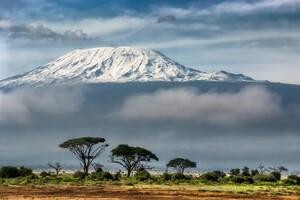This will happen regardless of whether action is taken to combat climate change or not.

Glaciers around the world, including the last ones that remaining in Africa will be irretrievably lost by 2050, according to a UN report. A third of the glaciers in UNESCO World Heritage sites will melt within the next three decades, the BBC reports.
And this melting will happen regardless of whether any measures are taken to combat climate change. The report, based on predictions made from satellite data, was published ahead of a climate conference to be held in Egypt.
Also read: Cultural heritage around the world is at risk due to climate change – scientists
There are 18,600 glaciers in 50 UNESCO World Heritage sites. This is almost 10% of the Earth's glaciers, which are located in tourist spots or regions sacred to local residents. The retreat or disappearance of glaciers is “one of the most dramatic indications that the planet's climate is changing.”
List of locations whose glaciers may disappear by 2050:
- Hirkan forests (Iran);
- Durmitor National Park (Montenegro);
- Virunga National Park (Democratic Republic of Congo);
- li>
- Huanglong Scenic and Historic District (China);
- Yellowstone National Park (USA);
- Mount Kenya National Park/Natural Forest (Kenya);
- Pyrenees Mont Perdue (France, Spain);
- Rwenzori Mountains National Park (Uganda);
- Putorana Plateau (Russia);
- Swiss Tectonic Arena Sardon (Switzerland);
- Nahanni National Park (Canada);
- Lorenz National Park (Indonesia);
- natural reserve system Wrangel Island (Russia);
- Kilimanjaro National Park (Tanzania);
- Yosemite National Park (USA);
- Dolomites (Italy);
- Unspoiled forests of Komi, Russia.
The report suggests that melting glaciers from the World Heritage regions could be responsible for the 4.5% rise in sea levels observed between 2000 and 2020 . These glaciers lose 58 billion tons of ice every year, which is equivalent to the total annual volume of water used in France and Spain combined.
Related video
Many people depend on glaciers as sources of water for domestic use and agriculture, and their loss could lead to water shortages during dry seasons. This, in turn, can lead to food security problems.
See special topic: Scientists predict an increase in the number of rainbows in the world This will be a consequence climate change. Cultural heritage around the world is at risk from climate change – scientists If nothing is done, artefacts and building ruins could be lost forever. Alpine glaciers are melting faster than ever – scientists The summer of 2022 has become the worst for the European Alps. More and more lakes with “boiling” methane on the surface appear in Alaska They are the result of melting permafrost. Greenland “has lost a lot of weight” due to melting ice – scientists NASA researchers have found a way to weigh the largest island on Earth.




